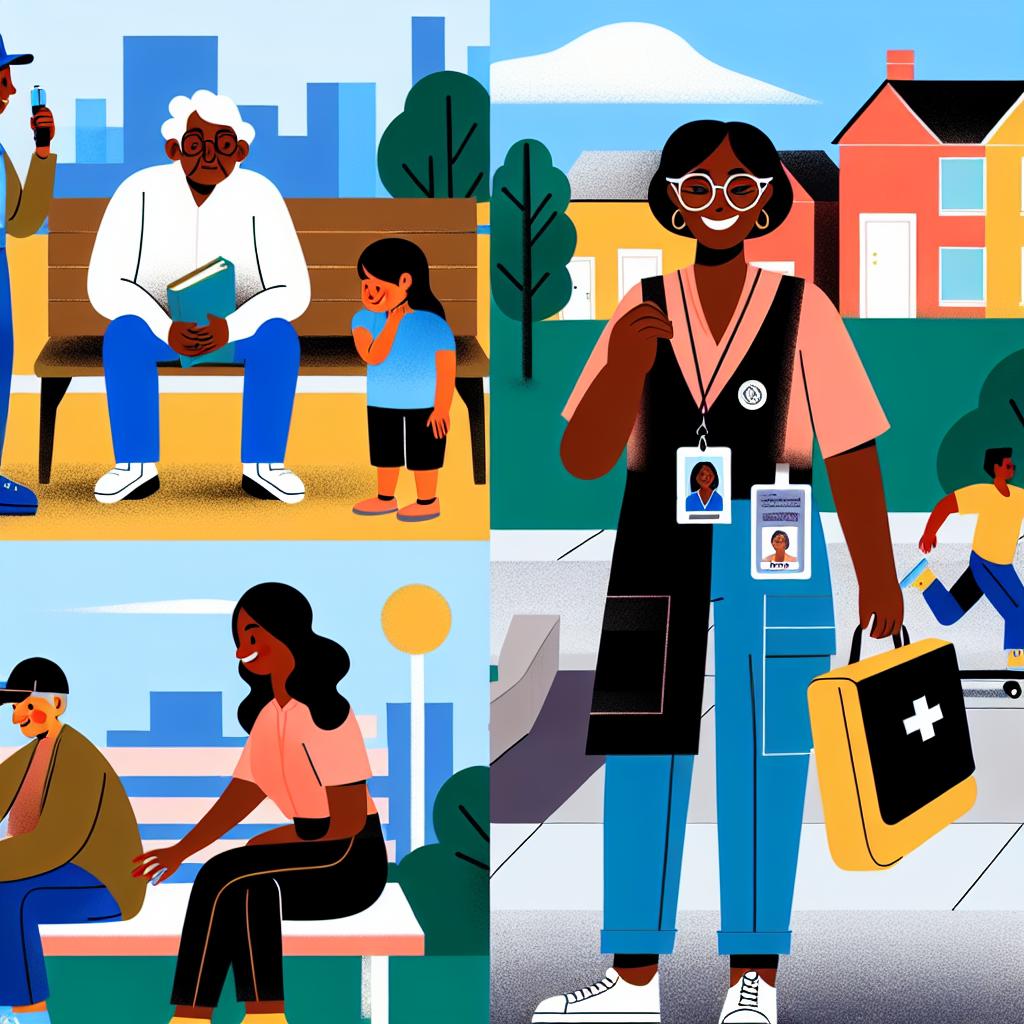Community health workers play a crucial role in promoting health in communities.
They provide education, support, and resources.
Understanding the differences between rural and urban areas is important.
This understanding impacts healthcare access and delivery.
Rural Areas
In rural areas, community health workers face challenges.
These challenges include limited access to healthcare facilities.
Lack of transportation is another issue.
They also encounter inadequate resources.
Community health workers play a vital role in bridging the gap.
They provide preventative care and health education.
They also connect residents to local services.
Urban Areas
In urban areas, community health workers deal with various issues.
These include overcrowded healthcare facilities.
High rates of chronic diseases are prevalent.
Diverse populations present additional challenges.
Community health workers focus on outreach programs.
Advocacy efforts are also important in addressing these needs.
Culturally sensitive care is essential for urban communities.
Impacts of Community Health Workers
Community health workers are instrumental in promoting health and well-being.
They impact both rural and urban areas significantly.
Transform Your Career Today
Unlock a personalized career strategy that drives real results. Get tailored advice and a roadmap designed just for you.
Start NowBy understanding the distinct challenges in each setting, they improve access.
These efforts enhance healthcare delivery for all community members.
Training and Education:
In rural areas, CHWs often have basic high school education requirements.
While in urban areas, CHWs may require formalized training programs.
The lack of formal education in rural areas can hinder their ability to understand complex health issues.
CHWs in urban areas may receive specialized training on diseases prevalent in urban populations.
The effectiveness of CHWs in rural areas may be limited due to their lack of comprehensive training.
Conversely, CHWs in urban areas may be more equipped to handle diverse health needs of urban populations.
Continuing education opportunities may be more readily available in urban settings compared to rural areas.
This can lead to urban CHWs staying updated on the latest health trends and practices.
The differences in training and education can significantly impact the effectiveness of CHWs in rural versus urban areas.
Scope of Practice:
Community health workers in rural areas often have a broader scope of practice compared to their urban counterparts.
In rural areas, CHWs may be responsible for a wider range of health services due to limited access to healthcare facilities.
They may provide basic health education, preventive care, and even assist with minor medical procedures in these underserved communities.
On the other hand, CHWs in urban areas typically focus more on connecting individuals to existing healthcare resources.
Their scope of practice may involve conducting health assessments, providing referrals, and coordinating care for residents in urban settings.
- Rural communities often face challenges such as geographic isolation, limited healthcare infrastructure, and shortages of healthcare professionals.
- Due to these unique needs, CHWs in rural areas play a crucial role in bridging the gap between residents and healthcare services.
- They may serve as liaisons between community members and healthcare providers, offering support and guidance to those in need.
- In urban areas, the focus may shift towards addressing issues such as high population density, cultural diversity, and socioeconomic disparities.
- CHWs in urban settings work towards promoting health equity, addressing social determinants of health, and advocating for marginalized populations.
Explore Further: Essential Qualities of a Successful Life Skills Instructor
Healthcare Access:
- Disparities in healthcare access exist between rural and urban areas.
- Community health workers bridge the gap and improve access to care in both settings.
In rural areas, limited healthcare facilities and providers contribute to poor access to care.
Residents often have to travel long distances to seek medical attention, resulting in delays in treatment and exacerbation of health conditions.
Showcase Your Business Today
Reach thousands of readers actively exploring professional services. Publish your business profile and grow your audience now.
Publish NowOn the other hand, urban areas have higher concentrations of hospitals and clinics, making healthcare more accessible to the population.
Community health workers play a vital role in addressing these disparities by providing outreach services in both rural and urban areas.
In rural communities, they serve as liaisons between residents and healthcare providers, helping individuals navigate the healthcare system and access necessary resources.
In urban settings, they work with underserved populations to connect them with affordable care options and support services.
By building trust within their communities, community health workers can encourage individuals to seek regular medical care and follow treatment plans.
They provide education on preventive measures, chronic disease management, and healthy lifestyle choices to empower individuals to take control of their health.
This proactive approach helps reduce the burden on healthcare systems and prevent costly hospitalizations or emergency room visits.
In rural areas, community health workers may organize mobile clinics or health fairs to reach underserved populations who lack transportation options.
By bringing essential healthcare services directly to these communities, they ensure that residents receive timely screenings, vaccinations, and preventive care.
This proactive approach helps prevent diseases and promotes early intervention, ultimately improving health outcomes in these areas.
In urban settings, community health workers collaborate with local clinics and social service agencies to address the social determinants of health that impact access to care.
They assist individuals in securing health insurance coverage, accessing affordable medications, and finding stable housing or food resources.
By addressing these underlying issues, community health workers help individuals overcome barriers to healthcare access and improve their overall well-being.
Additionally, community health workers play a crucial role in promoting health literacy and cultural competence within their communities.
They serve as advocates for patients, ensuring that their voices are heard and their concerns are addressed by healthcare providers.
By bridging the cultural and linguistic barriers that may exist, community health workers help improve communication and trust between individuals and the healthcare system, leading to better health outcomes for all.
Community health workers serve as essential members of the healthcare team in both rural and urban areas.
Their commitment to improving access to care, promoting preventive health practices, and addressing social determinants of health makes a significant impact on the well-being of individuals and communities.
By recognizing the unique challenges faced by each setting and tailoring their approach to meet the specific needs of residents, community health workers play a vital role in creating healthier and more equitable societies.
Find Out More: Advancement Opportunities for Mental Health Technicians
Cultural Competence:
Addressing the importance of cultural competence in healthcare delivery is crucial for ensuring quality care.
Understanding cultural nuances and traditions can help community health workers build trust with diverse populations.
In Rural Areas:
- Community health workers in rural areas must be aware of cultural beliefs and practices unique to the local population.
- Adapting their approach by incorporating traditional healing methods can resonate well with rural communities.
- Language barriers may also exist, requiring community health workers to provide information in the native languages of residents.
In Urban Areas:
- Urban areas are often more diverse, with residents from various cultural backgrounds and ethnicities.
- Community health workers in urban settings need to be sensitive to the cultural differences among the population they serve.
- Customizing health education materials and programs to be inclusive of different cultural perspectives is essential.
- Collaborating with local community leaders and organizations can help bridge cultural gaps and improve healthcare delivery.
Implications of Cultural Competence in Healthcare:
Cultural competence plays a vital role in healthcare delivery, especially for community health workers.
By adapting their approach to suit the cultural needs of rural and urban populations, community health workers can enhance the quality of care they provide.
Gain More Insights: Technology’s Role in Crisis Intervention
Challenges Faced:
- In rural areas, community health workers often face limited resources and provider shortages.
- Comparatively, urban areas present challenges such as high population density and complex healthcare systems.
Rural Challenges:
Community health workers in rural areas encounter unique difficulties in providing healthcare services to the underserved populations.
One significant challenge is the lack of resources, including medical facilities, equipment, and medications.
Often, rural areas have limited access to healthcare providers, making it difficult for community health workers to refer patients to specialists when needed.
Additionally, transportation can be a major hindrance in rural areas, especially in remote regions with poor road infrastructure.
Urban Challenges:
On the other hand, community health workers in urban areas navigate challenges stemming from the high population density.
The sheer number of people living in urban centers can overwhelm healthcare systems, leading to long wait times, crowded clinics, and difficulty in providing personalized care.
Urban areas also tend to have complex healthcare systems with various departments and regulations, making coordination and communication more challenging for community health workers.
Comparison:
While both rural and urban community health workers face obstacles in delivering services effectively, the nature of the challenges differs significantly.
Rural areas struggle with limited resources and provider shortages, impacting the quality and accessibility of care.
In contrast, urban areas grapple with high population density and intricate healthcare systems, posing barriers to efficient service delivery and patient outcomes.
Understanding these challenges is crucial for policymakers and stakeholders in healthcare to develop targeted interventions and support systems for community health workers in both rural and urban settings.
By addressing these issues, we can improve the overall health outcomes and well-being of the communities they serve.
Explore Further: Preventative Strategies in Family Support Services

Success Stories:
Community health workers in rural areas have made significant strides in improving healthcare access.
For example, in a remote village, a community health worker organized free health camps.
Showcase Your Business Today
Reach thousands of readers actively exploring professional services. Publish your business profile and grow your audience now.
Publish NowThese camps provided basic healthcare services to residents who otherwise had limited access.
As a result, many individuals received crucial medical attention and preventive care.
This initiative led to a decrease in the prevalence of common illnesses in the community.
Impact in Urban Areas:
Similarly, community health workers in urban settings have also achieved remarkable outcomes.
One urban community health worker implemented a nutrition education program in low-income neighborhoods.
Through this program, families learned how to make healthier food choices on a budget.
As a result, the prevalence of diet-related illnesses in the community decreased significantly.
This success story underscores the vital role of community health workers in urban healthcare.
Collaborations and Partnerships:
In the realm of community health, collaborations between community health workers (CHWs) and other healthcare providers are essential to ensure comprehensive and effective care for individuals and communities.
These partnerships foster a holistic approach to health and enable a more coordinated effort in addressing various health issues.
-
Importance of Collaborations:
Collaborations between CHWs and other healthcare providers play a crucial role in bridging gaps in healthcare services and ensuring that individuals receive the necessary support and resources for their well-being.
-
Differences in Rural and Urban Areas:
Collaborations between CHWs and healthcare providers may differ in rural and urban areas due to varying healthcare infrastructure and resources.
In rural areas, where access to healthcare services is limited, collaborations between CHWs and healthcare providers are vital to ensuring that individuals receive the care they need.
On the other hand, in urban areas, collaborations may focus more on coordinating care for a larger population and addressing specific health issues prevalent in urban settings, such as infectious diseases or chronic conditions.
-
Benefits of Collaborations:
Collaborations between CHWs and healthcare providers offer a range of benefits that contribute to improving community health outcomes.
Some of the benefits include improved communication and coordination of care, increased access to healthcare services, enhanced health education and promotion efforts, and better management of chronic diseases.
These collaborations also help in identifying and addressing social determinants of health that may impact individuals’ health and well-being.
Overall, collaborations and partnerships between community health workers and other healthcare providers are instrumental in creating a cohesive and supportive healthcare system that addresses the diverse needs of individuals and communities.
By working together, these professionals can leverage their unique skills and expertise to deliver high-quality care and improve health outcomes for the populations they serve.
Community Health Workers as Crucial Links in Healthcare
Community health workers play a crucial role in bridging healthcare gaps in rural and urban areas.
They provide essential health education, support, and resources to underserved populations.
Despite facing unique challenges in each setting, these workers are vital in promoting health equity.
They improve overall community well-being.
These workers serve as a link between communities and formal healthcare systems.
Their grassroots approach enables them to address specific health needs.
Cultural sensitivities may not be easily addressed by traditional healthcare providers.
The significance of community health workers cannot be overemphasized.
They are instrumental in reducing health disparities and promoting preventive care.
Their presence in both areas ensures that individuals have access to quality healthcare services.
Community health workers serve as indispensable assets in healthcare delivery.
They advocate for health equity and empower communities.
Their work exemplifies the importance of grassroots efforts in addressing healthcare disparities.
Improving overall population health is their ultimate goal.
Undoubtedly, their contributions play a key role in shaping a healthier future for all.
Additional Resources
Social Determinants of Health and Older Adults | odphp.health.gov
Addressing Social Determinants of Health: Examples of Successful …
[E-Books for Sale]
The Big Book of 500 High-Paying Jobs in America: Unlock Your Earning Potential
$19.99 • 500 High-Paying Jobs • 330 pages
Explore 500 high-paying jobs in America and learn how to boost your career, earn more, and achieve success!
See All 500 High-Paying Jobs of this E-Book
1001 Professions Without a Degree: High-Paying American Jobs You Can Start Now
$19.99 • 1001 Professions Without a Degree • 174 pages
Discover 1001 high-paying jobs without a degree! Unlock career tips, skills, and success strategies for just $19.99!




